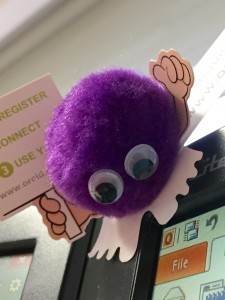I first heard about ORCID in the postgraduate room in the Templeman Library at the end of November 2014, when Lesley Gould informally asked the regular users of the room whether we wanted to participate in the project. I immediately liked the concept behind ORCID and the benefits of having, through an ORCID number, a detailed, up-to-date and traceable web presence.
Two days later, I met Kirsty and started my job as an ORCID ambassador in the School of English (my school) and, to a certain extent, with friends and colleagues from the School of European Culture and Languages. I found out that most people from across the humanities postgraduate community were fascinated by ORCID – were they Master’s students about to consider the possibility of applying to a PhD or final-year research students, they all found the idea of an ORCID number useful. Also, everybody seemed to love the “Cids”, and now most computers in the postgraduate room and the AAL offices in the school of English have a bug on their screen frame!
As much as I left postcards and small cards around the department and in pigeonholes of Postgraduates who teach and early-career researchers, I think that people preferred to know more about ORCID when I spoke to them directly about the project. So, some of the reading groups and Postgraduate seminars that I normally attend where the perfect platform for me to hand out the material and deliver a brief presentation about ORCID. At the same time, the informal setting of working spaces and common rooms was great to have an easy chat with colleagues who had already heard about ORCID, or seen it advertised on campus without fully knowing what it was.
My moment of greatest success, however, was when a friend who lives abroad and with whom I was then co-editing a special issue (now published) told me that she wanted to change her name on it. Her case was a perfect case where having an ORCID number would make a difference! I told her about the project, and she decided to sign up for it immediately. I’m happy and proud that, through my work at ORCID, I have been able to offer a simple, straightforward and useful tool which I’m sure will make life so much easier for many researchers, now and in the future.
